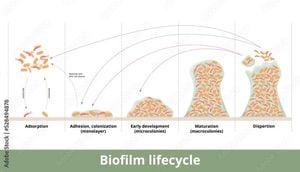The political ramifications of Project 2025 are becoming clearer as the Trump administration begins to take shape following the recent election. This initiative, spearheaded by the Heritage Foundation, has sparked intense debate and concern among various political factions, especially among Democrats.
During the 2024 election, Project 2025 was characterized by liberals as potentially harmful, with Vice President Kamala Harris leading the charge against its agenda. The Harris campaign positioned Project 2025 as emblematic of Trump’s policies, anticipating it would galvanize moderate and progressive voters. Consequently, ads targeting Project 2025 even appeared on unconventional platforms like pornography websites and dating apps, highlighting the campaign's urgency. Despite these efforts, Trump’s winning streak across key swing states and even the nationwide popular vote exposed the flaws within this strategy.
Critics argue the exaggerated focus on Project 2025 mischaracterizes the nature of Trump’s base. While the perception of the MAGA coalition as fundamentally Christian nationalist is prevalent, it is, according to some analysts, more accurately viewed as a populist movement. This coalition encompasses diverse groups, including technocrats, New Age seekers, and individuals from various religious backgrounds, all collectively united by their disdain for the so-called “Deep State.”
Kaleb Graves, a minister and educator, elaborates on this perspective, cautioning against viewing Project 2025 solely through the lens of Christian nationalism. He emphasizes the need to recognize the political pluralism within Trump’s base. Figures from different faiths, including Islam and Hinduism, represent significant segments of the MAGA coalition, alongside those who identify as ‘spiritual but not religious.’ The diverse ideological spectrum within this coalition suggests potential resistance against certain elements of Project 2025.
On January 22, 2025, the Senate witnessed another pivotal moment as Russ Vought, nominated by Trump to lead the Office of Management and Budget (OMB), faced fierce questioning from Democrats. The discussions centered on Vought’s commitment to Project 2025, especially its controversial proposals to cut funding for health care and social support programs.
Democratic leaders, including Sen. Jeff Merkley, criticized Vought’s plans, framing them as harmful to working families. During the hearing, they noted alarming projections indicating the rich would benefit immensely from tax cuts, possessing the potential to exacerbate income inequality. Vought’s defense of these tax policies, which he argued were necessary to stimulate business, left many Democrats unconvinced and frustrated.
Vought’s testimony also invoked the contentious issue of appropriated funds from President Biden’s initiatives. With Vought defending what he termed as necessary pauses to align funding with Trump’s agenda, some senators accused him of attempting to implement unconstitutional impoundment strategies. Sen. Patty Murray underscored the risks of undermining lawful government funding processes, fearing such actions could destabilize federal support structures.
Throughout the hearing, Vought's ties to Project 2025 were evident, and he was pressed on his previous advocacy for drastic cuts to several social programs. His reluctance to directly answer questions about his proposed cuts drew sharp criticism from several senators. They underscored the moral imperative of protecting vulnerable populations who rely on programs like Medicaid and SNAP, challenging Vought’s insistence on fiscal responsibility without adequate provisions for public welfare.
Compounding these tensions was Vought’s apparent anti-abortion stance, which he openly acknowledged, asserting alignment with Trump’s policies. This admission led to pointed inquiries from Sen. Murray, who pressed for clarity on Vought’s position concerning exceptions for severe cases such as rape, incest, or maternal health, illuminating the overlaps between Project 2025 and broader social policy debates.
With Project 2025 serving as the backdrop for these developments, analysts and political analysts argue it encapsulates more than just Trump’s vision; it outlines his coalition's precarious balancing act among disparate interest groups. The potential fallout from implementing Project 2025 could endanger support from various allegiances within the MAGA movement, as many segments would find specific proposals contradicting their goals.
The path forward for the Trump administration and Project 2025 is fraught with complexity and potential conflict. Observers note the necessity for the administration to navigate carefully to maintain its coalition's fragile unity. Particularly, proposals within Project 2025 advocating more stringent social policies could drive wedges between constituencies.
Historians and political commentators alike suggest remaining vigilant about the practical repercussions of Project 2025 across the United States. The project's strong vocal presence during the election campaign hasn’t dwindled but rather crystallized as the administrative focus shifts to real policy. The ramifications for millions of Americans hang delicately, hinging on legislative decisions and political maneuvering within Congress.
Given the multifaceted nature of Project 2025 and its Tanglewood of support and opposition, it is evident political discourse surrounding it will only intensify. The future of health care, social programs, and fiscal policy are now closely linked to the administration's support for this initiative and its reconfiguration of traditional political alliances.
The Democratic Party faces the complex challenge of countering not just the policies outlined under Project 2025 but reestablishing the narrative concerning its impact on everyday Americans. The political battlefield may hinge on public perception as much as legislative action, making the story of Project 2025 just as ideological as it is practical going forward.



